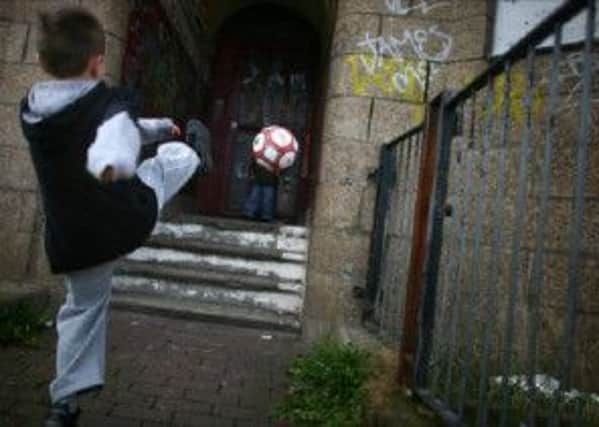Poverty is a child protection issue


Most people think that child protection is about abuse. The common perception is that if an issue is deemed to be a child protection matter, then the child is being physically or sexually abused or neglected. The image that the public often come up with is a child whose parents are drug addicts or alcoholics. A single mother with a violent partner. The memories of Baby Peter loom large.
When you mention child protection, one thing people are unlikely to think of is poverty. Poverty is defined in language terms as a “the state of being extremely poor”. In economic terms is it living at less than 60 per cent of the (fluctuating) average wage.
Advertisement
Hide AdAdvertisement
Hide AdBut poverty is a child protection issue and with the increase in the numbers of families living in poverty it is becoming more and more of a problem in Scotland. If you don’t have enough money to buy food, your child goes hungry. If you don’t have enough money to heat your home and buy clothes, your child will be cold. If you don’t have enough money to pay your rent, your child will be homeless. In those cases the child, and the family, need to be protected.
The Child Poverty Action Group calculates that 220,000 children live in poverty in Scotland. That’s one in five children, but we know that in some areas, that figure is one in three. We know that in some areas out of a class of 30 children, ten of them can be living in poverty.
Living in poverty puts health, wellness and the ability to do well at school at risk. It’s not just a case of not having nice clothes and not being able to go on holidays. We are dealing with families who rely on food banks and emergency grants, not to get over a difficult time, but to survive. We are living in a society now where GPs routinely ask people, when they can find no other cause for their pain or illness, if they have enough to eat.
Living in poverty creates long-term difficulties for these children, who grow up at greater risk of mental ill health, chronic illness, unemployment and homelessness; and so the cycle continues.
As a profession, it is a social worker’s job to support people in times of crisis. It is also our job to advocate on behalf of these people to try to raise awareness of the conditions which might create crisis in the first place.
There are lots of well-understood routes out of poverty that governments will be working on: income maximisation, increasing pay rates, suitable benefits, affordable childcare and the removal of barriers to education. But these are for the long term. We are facing a crisis now.
The Institute of Fiscals studies acknowledges that poverty increased quickly between 2011-12 and 2014-15 and further states that it will continue to increase with the introduction of Universal Credit, the latest iteration of the welfare reforms. It’s a well-acknowledged fact that only around 40 per cent of the cuts have so far impacted and that 2015-16 is to be the harshest year to date.
It is not our job as professionals to point the finger and get into the politics of why something has happened. It has happened and we all need to be aware that the situation is getting worse and people, particularly children are suffering.
And literally, we haven’t see the half of it yet.
Advertisement
Hide AdAdvertisement
Hide AdMany of the people we support are fearful for what the future holds, some are looking at a further reduction in benefit of £70 per child. Can you imagine the despair of parents who are fully aware of being unable to meet the basic needs of their children? Can you imagine the impact of the indignity of living in long-term poverty? And most importantly, can you imagine the impact on children’s confidence and self-worth?
As social workers, we are seeing more and more people who need help because they are poor. People who have never needed help previously; people with jobs who just can’t make ends meet; people who are really trying and are doing the best they can, but it’s just not enough. The stress of parenting in this context means there is a need for all public services to treat poverty as a child protection issue. And treating it as such might lead us to a place where we can do something about it.
No one wants to let children down: not parents, not schools, not society. We need to do better for our kids.
• Harry Stevenson is President of Social Work Scotland, www.socialworkscotland.org
SEE ALSO